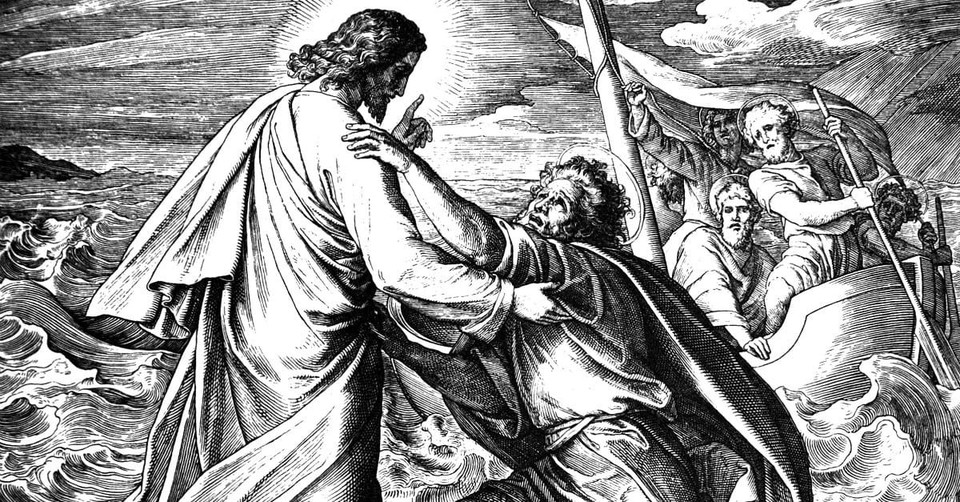A Walk to Remember

Another example of a subtle allusion in the text of the Gospels is found in the events that follow the feeding of the multitudes. After feeding the 5,000 men (we can assume there were in upwards of 15,000 there with women and children present), Jesus “made His disciples get into the boat and go ahead of Him to the other side, to Bethsaida, while He dismissed the crowd” (Mark 6:45 HCSB).
The disciples, many of whom were fishermen, had made this same journey many times. But what should have been an effortless trip on a familiar body of water turned into an unforgettable experience. We read in the Gospel of Mark: “And when evening came, the boat was out on the sea, and he was alone on the land. And he saw that they were making headway painfully, for the wind was against them. And about the fourth watch of the night he came to them, walking on the sea. He meant to pass by them...” (6:47–48, emphasis mine).
John’s Gospel tells us that they began their journey across the lake “when evening began,” roughly around 6:00 p.m. (see John 6:15). Since they did not see Jesus until “the fourth watch of the night,” we know that they could have been struggling in the storm for up to seven hours, paddling to the middle of the lake—a distance of no longer than four miles.
At first, the disciples saw the figure of a man walking across the waves, and they thought that he was a ghost. It would have been an easy assumption to make: Waves were crashing against the small boat, the wind was ripping across their faces, and they were probably fearful for their very lives. Every one of their senses was heightened, and their imaginations were running wild with thoughts of how they might die in the middle of this lake they’d grown up on. Exhausted and scared at three in the morning, they see a man walking toward them where they know there is nothing but water. To add to this frightening scene, the text tells us that they sensed that he meant to pass by them. What a strange situation!
Commentators are divided over the purpose of Jesus’s actions. Some suggest Jesus attempted to surprise them on the water to see if they would notice it was him. Others believe he didn’t intend to stop at all, but upon recognizing their fear, he turned toward them. One person has even suggested that Jesus wanted to remain unrecognized so he could frighten the disciples. I’m not convinced that any of these explanations make good sense of the text. In order to understand why Jesus meant to pass them by, we need to recognize a connection in this passage to the Old Testament. Again, we pay attention to key words and phrases. There are two that are significant here: the words “meant” and “pass by.”
Saying that Jesus meant or intended to pass them by suggests that there was intention in what Jesus was doing. It leaves no room for chance or happenstance. Jesus willed this to happen to prove a point. This phrase is used elsewhere to describe an epiphany, something that discloses or unveils the identify of God. This rare revelation is seen a few times in scripture. John P. Meier states, “God made striking and temporary appearances in the earthy realm to a select individual or group for the purpose of communicating a message.”
There are at least two notable occurrences when God intentionally passed by individuals. On Mount Sinai, God passed by Moses.
Moses said, “Please show me your glory.” And he [God] said to him, “I will make all my goodness pass before you and will proclaim before you my name ‘The Lord.’ And I will be gracious to whom I will be gracious, and will show mercy on whom I will show mercy. But,” he said, “you cannot see my face, for man shall not see me and live.” And the Lord said, “Behold, there is a place by me where you shall stand on the rock, and while my glory passes by I will put you in a cleft of the rock, and I will cover you with my hand until I have passed by. Then I will take away my hand, and you shall see my back, but my face shall not be seen” (Exod. 33:18–23, emphasis mine).
In this passage from Exodus, God reveals himself to Moses— something of his nature and character is made known—by passing him by.
In another instance of the Lord “passing by” an individual in a revealing manner, the Lord manifests himself before Elijah on Mount Horeb:
And he [God] said [to Elijah], “Go out and stand on the mount before the Lord.” And behold, the Lord passed by, and a great and strong wind tore the mountains and broke in pieces the rocks before the Lord, but the Lord was not in the wind. And after the wind an earthquake, but the Lord was not in the earthquake. And after the earthquake a fire, but the Lord was not in the fire. And after the fire the sound of a low whisper (1 Kings 19:11–12, emphasis mine).
What is happening in this passage in Mark 6? Instead of suggesting that Jesus was going to bypass or walk around the disciples in the boat, Mark may be intentionally linking this episode to those where God reveals himself to Moses and Elijah. New Testament scholar Richard Hays asserts, “Jesus ‘passing by’ the disciples should be “read as an allusion to the Exodus theophany, suggests simultaneously that Jesus’ walking on the water is a manifestation of divine glory.” By walking on the water, Jesus is showing himself to possess power and authority as the Creator. His actions preach a message to his disciples—that is what is meant by “passing them by.” He was, without saying a word, proclaiming that he is the God of Moses and Elijah, and he revealed his divinity by giving evidence of his oneness with God.
But the story does not end there. In the midst of the raging storm on the Sea of Galilee, Jesus speaks a word of encouragement to his disciples: “Have courage! It is I. Don’t be afraid” (Mark 6:50 HCSB). The phrase “do not be afraid” is used one hundred times from Genesis to Revelation, and it is typically spoken as a word of assurance prior to a revelatory moment.
How could the disciples relax in the middle of a storm at sea? Jesus assures them, “Do not fear, I Am.” Much like the I Am statements we saw in John’s Gospel, the reader is again reminded of Exodus 3, when God responded to Moses’ question about his name, “I am who I am” (Exod. 3:14 HCSB). The name speaks to God’s constant presence: I always was, always am, and always will be. Isaiah repeatedly used this phrase in reference to God:
Isaiah 43:25: “I, I am he who blots out your transgressions for my own sake, and I will not remember your sins.”
Isaiah 48:12: “Listen to me, O Jacob, and Israel, whom I called! I am he; I am the first, and I am the last.”
Isaiah 51:12: “I, I am he who comforts you; who are you that you are afraid of man who dies, of the son of man who is made like grass.”
And when Jesus was arrested by the temple police in the garden, he used God’s name to identify himself to the guards. “Then Jesus, knowing all that would happen to him, came forward and said to them, ‘Whom do you seek?’ They answered him, ‘Jesus of Nazareth.’ Jesus said to them, ‘I am he.’ Judas, who betrayed him, was standing with them. When Jesus said to them, ‘I am he,’ they drew back and fell to the ground” (John 18:4–6, emphasis mine). Notice that when Jesus speaks these words, he is doing more than speaking a few words. At the mention of “I am,” the men were hurled to the ground. Jesus associates himself with the I Am of the Old Testament, the self-chosen name of the God of Israel.
When Jesus speaks to his disciples from the storm, instead of falling away in fear, the disciples are comforted and drawn to him. And as they realize it is their teacher and rabbi, they fall down and worship Jesus as he enters the boat. Why? Because by his actions and in speaking the divine name, he has just told them who he is in a language they understand.
Again, Richard Hays points out the significance of this event: “When Jesus speaks this same phrase, ‘I am,’ in his sea-crossing epiphany it serves to underscore the claim of divine identity that is implicitly present in the story as a whole.” It is easy for Western ears to miss these subtle hints. That is why we must learn to bend our ears to an Eastern dialect to catch the full meaning behind this encounter. The message that comes across is unmistakably clear: Jesus Christ is more than just a man. He is the Creator God, the God of Israel, and the I Am of the burning bush. He is fully human, yet he is fully God simultaneously.
Taken from The Forgotten Jesus by Robby Gallaty. Copyright © 2017 by Robby Gallaty.Used by permission of Zondervan. www.zondervan.com.

Image courtesy: ©Thinkstock/Ruskpp
Publication date: April 10, 2017
Originally published April 10, 2017.







